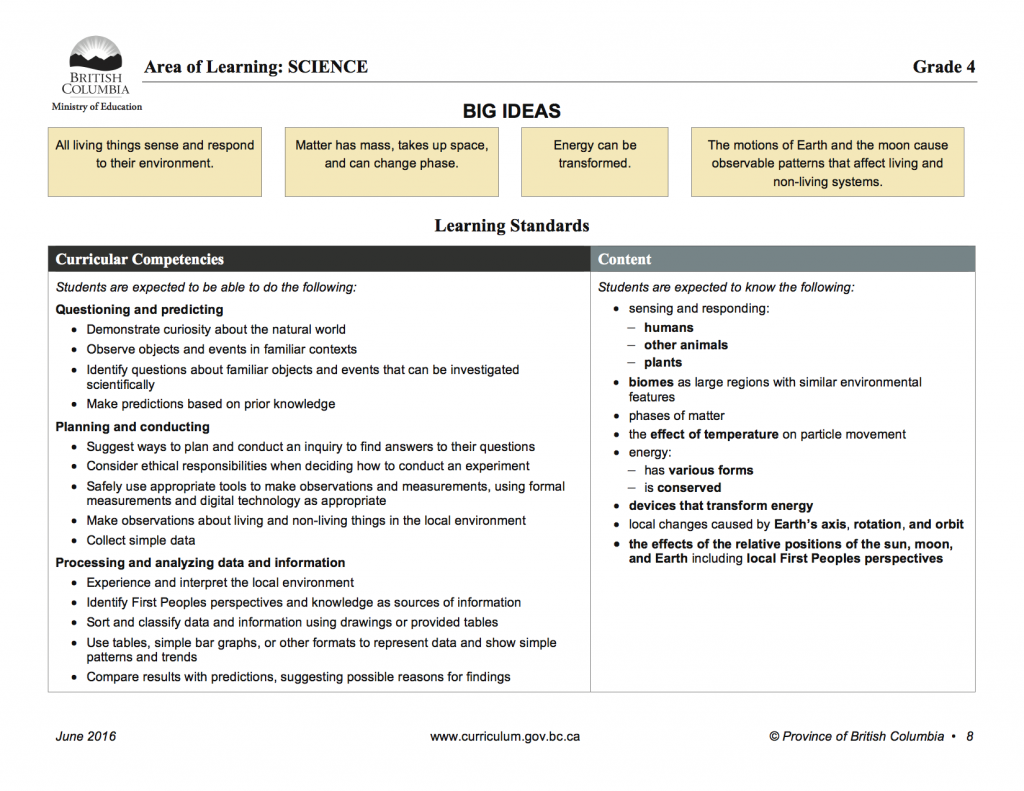Alex Chattwood, Communication, Education & Outreach Editor
On the first day of the 2016–17 school year, the new curriculum became mandatory in K–9 classrooms across British Columbia, with Grade 10–12 to follow suit next year. Sweeping changes have given both educators and students a lot to think about. I decided to survey some of them to find out what excites them most about the changes and what they think will be their biggest challenges.
What excites you most about the new curriculum?
“I like how the new curriculum fosters authentic learning through an inquiry approach, instead of a content-heavy approach.”
Mary, Grade 2/3 teacher in Vancouver
Inquiry-driven learning is the beating heart of the new curriculum. Based on an educational theory called “constructivism”, its central tenet is that knowledge is primarily built from the ground-up inside the mind of each individual learner and not through the more traditional mode of information transfer from teacher to student.
“More flexibility to teach what is most important and to focus more on skills than knowledge.”
Adam, Grade 10–12 teacher in Burnaby
A curriculum based on inquiry allows teachers to give students more control over their learning. Taken to the extreme, this means that, in science for example, students can choose to answer their own questions, design and perform their own investigations and draw their own conclusions.
An Inquiry approach places a premium on the learning process. This is apparent in the on-the-page real estate shrinkage of “content” relative to “competencies” in the new curriculum documentation. The previous curriculum presented these two standards of learning entirely separately. Now they are presented side-by-side, on the same page with competencies taking up the lion’s share of the space.
The emphasis on skills in the new curriculum is illustrated in this snapshot of Grade 4 science,
in which curricular competencies occupy two thirds of the on-page real estate.
“I’ve heard that there will be less exams and more applications to what we learn…”
Grade 11 student
The number of provincial exams Grade 10–12 students will be required to sit will drop from five to two. In science and social studies, classroom-based assessments worth 20% of the final mark will be used.
What do you feel will be your biggest challenge?
“As a new, less experienced teacher, I am worried about my lack of depth affecting my ability to have lessons that fit multiple core competencies and big ideas at once.”
Jordan, Grade 8–11 teacher in Vancouver
“Big Ideas” are already used in other provinces, including Ontario. They are concepts and principles introduced in kindergarten that evolve in sophistication through to grade 12. For each subject in each grade, students will be expected to understand 4 Big Ideas.
Big Idea |
Grade |
| Living things are diverse, can be grouped, and interact in their ecosystems. | 3 |
| All living things sense and respond to their environment. | 4 |
| Multicellular organisms have organ systems that enable them to survive and interact within their environment. | 5 |
One of the Big Ideas in Grade 4 science (in red) shown next to the corresponding Big Ideas in Grade 3 and Grade 5.
“Finding resources to assist me in effectively delivering the content will be difficult – I don’t know where to begin and I feel like I may become burnt out starting from scratch again.”
Mary, Grade 2/3 teacher in Vancouver
Many of the teachers I’ve spoken to are surprised that there are not more readily available resources to help them transition to the new curriculum. The BC Ministry of Education only has a small number of case studies on its website that illustrate how the new curriculum can be implemented. Until this resource is more fully developed, teachers must turn to other education and professional development organizations to assist them with in-class implementation. For instance, Science World in Vancouver offers free online science resources as well as professional development workshops for teachers on subjects including implementing and assessing inquiry in the classroom and on place-based learning. The First Nations Education Steering Committee (FNESC) helps teachers find resources that ensure First Peoples content is authentic.
“Trying to do more projects and get them all in on time.”
Grade 11 student
Students I surveyed had varied views of the assessment changes. Yes, most students are excited about sitting fewer exams. But, they are also aware that reduced end-of-year exam stress means more project deadlines to manage throughout the year. Many wrote that this will be a “hard” adjustment to make, but worthwhile. Some students would rather do provincial exams.
Anything else you want to share?
“I think the shift is good overall, but it has been slow coming at the senior grades, giving teachers little time to truly prepare and pilot the new curriculum this year before it becomes mandatory next year.”
Adam, Grade 10–12 teacher in Burnaby
“The funding has to be put in place to make the changes applicable and sustainable. The public school system can’t take more budget cuts.”
Rike, K-12 educator
“Implementing this new curriculum and completely abolishing the provincial exams is not a good idea in my honest opinion because all teachers are subjective towards other students and you won’t know for sure whether you thoroughly understand the material you learned in a year unless you complete your province-wide exam with a satisfied grade.”
Grade 11 student
“The prevailing educational paradigm operates like a pendulum. At times, it is more liberal and open, and other times, more conservative and rigid. The best educators will stay their course and carry on their good work, relying on evidence-based best practices to serve their students.”
Grade 8–12 teacher, School District 36
Got more questions about the new BC curriculum? This FAQ from the BC Ministry of Education is a good place to start.
What do you think about the new BC curriculum? Share your thoughts in the comments section below or complete my survey here.





